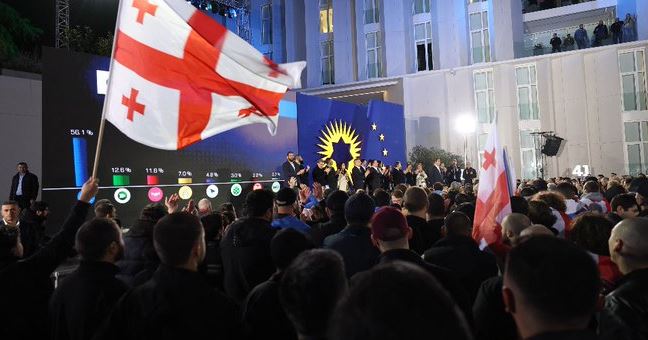Tbilisi: Georgia has been thrown into a state of political upheaval following a contentious parliamentary election on Saturday, which the ruling Georgian Dream party declared a victory, amidst allegations of widespread fraud by opposition groups. The election, scrutinized as a litmus test for Georgia’s democratic integrity, has potentially jeopardized the nation’s path towards European Union integration.
The European Union had previously cautioned that the electoral outcome would significantly impact Georgia’s EU membership prospects. International observers, while noting the logistical organization of the election day, criticized the overall environment, describing it as “marred by an uneven playing field, pressure, and tension.” Particularly, an EU parliamentary mission voiced concerns over “democratic backsliding,” reporting incidents of “ballot box stuffing” and violence against observers.
According to preliminary results from over 99% of the precincts, Georgian Dream secured 54.08% of the votes, against the opposition’s 37.58%. This outcome provides Georgian Dream with 91 seats in the 150-member parliament, short of the supermajority they aimed for to enact constitutional changes but sufficient for governance.
Prime Minister Irakli Kobakhidze celebrated the “impressive victory,” denouncing the opposition’s accusations of electoral irregularities as attempts to destabilize the country. However, an exit poll by Edison Research suggested a different outcome, predicting an opposition victory by 11%.
Opposition leaders, including Tina Bokuchava of the United National Movement, vehemently rejected the results, labeling the election as “stolen” and vowing not to recognize its legitimacy. Nika Gvaramia from the Akhali party described the electoral process as a “constitutional coup.”
The situation was further complicated by reports from the ground. An observer at a polling station in Sadakhlo reported witnessing “massive ballot stuffing” in favor of Georgian Dream, hinting at coordinated efforts to manipulate the vote.
A joint statement from international observers, including representatives from the OSCE, the Council of Europe, and the European Parliament, highlighted the lack of impartiality in state institutions, suggesting these issues could erode public trust in the electoral process.
Political analyst Gela Vasadze commented that Georgia might face prolonged instability, with the opposition lacking the leadership to mobilize significant protest action. This comes on the heels of earlier mass demonstrations against perceived threats to democratic freedoms and a shift in Georgia’s foreign policy alignment.
In recent years, Georgian Dream has shifted its stance, promoting narratives of external threats and adopting policies seen as suppressing civil liberties, moves that have stalled Georgia’s EU accession and drawn international criticism.
As tensions mount, observers from the OSCE are scheduled to provide further insights later today, potentially shedding more light on the integrity of the electoral process in Georgia.



